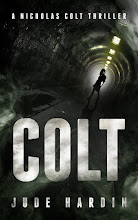What's Your Book About?
Ever been asked that question?
Sure you have.
My stock answer (to well-meaning but often naïve laypeople) is usually “murder,” which invariably stops them dead in their tracks. What they’re after, really, is a plot summary.
But plot summaries, to me, are boring. Every plot imaginable has been told thousands of times. Plots are finite, characters infinite. But even a well-drawn, compelling character might fall short in the eyes of an acquisition editor.
So what makes my book different? Why would anyone want to read another story where a PI gets involved in a murder/kidnapping case?
The answer, if you think about it, isn’t what the story is about, but why this character goes to great lengths, risking life and limb, to solve a case (or win someone’s love, or save the world, etc.), when it would be so much easier just to walk away. Why bother?
If you really want to answer the question, you have to start thinking about themes. Not what, but why.
You might not start out with a theme in mind. Even if you don’t, subconsciously there is a current that drives the people in your novel to do what they do. The characters themselves might not be able to vocalize it. The reader might never recognize it. But it’s there. It has to be there, or there is no story. Not one of lasting value, anyway.
Personally, I don’t think about themes at all while I’m writing. But when I go back and read, study, what I’ve written, I can often see that yes, that’s what this was all about!
It’s a magical moment when you discover a theme. Don’t waste it. Go with it, explore and exploit it, rewrite until every scene relates back to it.
If you don’t have any themes in mind when you start, don’t worry. They will emerge. When they do, the smart writer takes advantage of them.
So, dear friends. Tell me. What’s your book about?
This is a rerun. It was originally posted November 2006.
Sure you have.
My stock answer (to well-meaning but often naïve laypeople) is usually “murder,” which invariably stops them dead in their tracks. What they’re after, really, is a plot summary.
But plot summaries, to me, are boring. Every plot imaginable has been told thousands of times. Plots are finite, characters infinite. But even a well-drawn, compelling character might fall short in the eyes of an acquisition editor.
So what makes my book different? Why would anyone want to read another story where a PI gets involved in a murder/kidnapping case?
The answer, if you think about it, isn’t what the story is about, but why this character goes to great lengths, risking life and limb, to solve a case (or win someone’s love, or save the world, etc.), when it would be so much easier just to walk away. Why bother?
If you really want to answer the question, you have to start thinking about themes. Not what, but why.
You might not start out with a theme in mind. Even if you don’t, subconsciously there is a current that drives the people in your novel to do what they do. The characters themselves might not be able to vocalize it. The reader might never recognize it. But it’s there. It has to be there, or there is no story. Not one of lasting value, anyway.
Personally, I don’t think about themes at all while I’m writing. But when I go back and read, study, what I’ve written, I can often see that yes, that’s what this was all about!
It’s a magical moment when you discover a theme. Don’t waste it. Go with it, explore and exploit it, rewrite until every scene relates back to it.
If you don’t have any themes in mind when you start, don’t worry. They will emerge. When they do, the smart writer takes advantage of them.
So, dear friends. Tell me. What’s your book about?
This is a rerun. It was originally posted November 2006.


6 Comments:
When asked that question, the shorter the answer the better, LOL. I hate when people go on for half an hour telling you what their book is about.
I feel like saying, "I have ADD. My eyes glaze over after one minute of any subject. Please don't make me pretend to be interested for hours."
I agree, Natasha. It's the same when people start recounting the plot to a movie. Drives me nuts.
"Murder" is a good answer.
In my world, "sex" is an equally effective silencer. =)
Lainey:
Love it!
Hi Jude
The 'elevator pitch' is a great concept, and one I'm sure you've come across many times before, but it's always worth repeating: You get into an elevator, the doors close and you find the only other occupant is a top New York editor/agent/publisher.
You've got until the doors open again to tell them enough about your book to make them hand you a card and say, "Sounds interesting. Give me a call."
And like Spyscribbler says, 'Short is good.' If people want to know more than a few sentences, they'll ask.
Zoe:
Absolutely. It's always good to have an elevator pitch ready, just in case.
Post a Comment
Subscribe to Post Comments [Atom]
<< Home